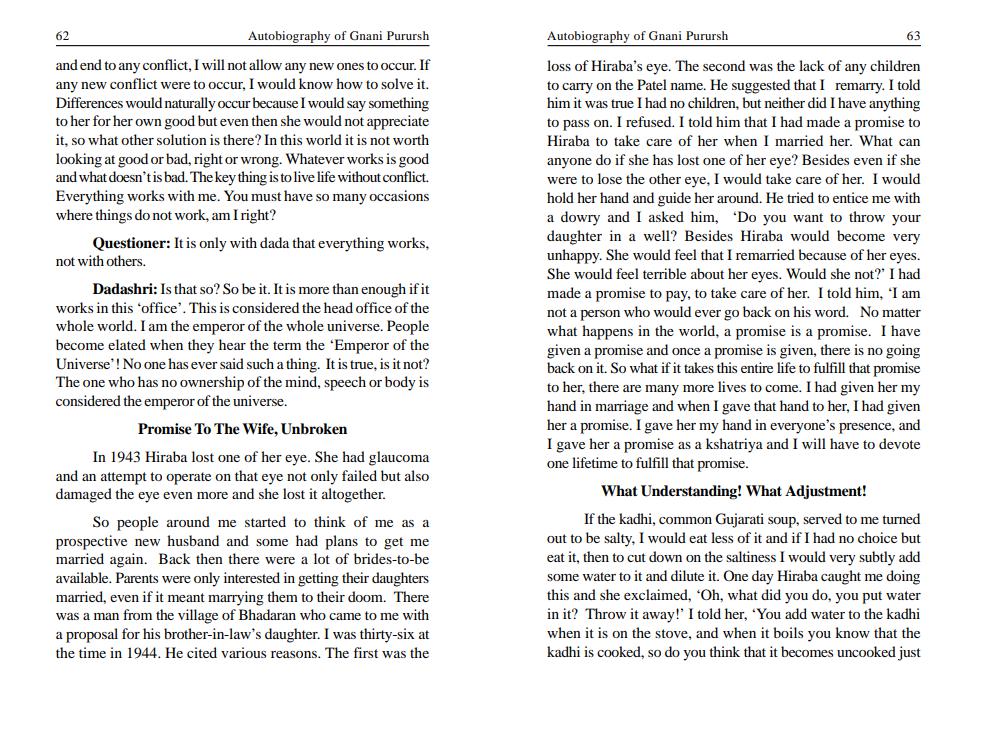________________
62
Autobiography of Gnani Purursh
Autobiography of Gnani Purursh
and end to any conflict, I will not allow any new ones to occur. If any new conflict were to occur, I would know how to solve it. Differences would naturally occur because I would say something to her for her own good but even then she would not appreciate it, so what other solution is there? In this world it is not worth looking at good or bad, right or wrong. Whatever works is good and what doesn't is bad. The key thing is to live life without conflict. Everything works with me. You must have so many occasions where things do not work, am I right?
Questioner: It is only with dada that everything works, not with others.
Dadashri: Is that so? So be it. It is more than enough if it works in this 'office'. This is considered the head office of the whole world. I am the emperor of the whole universe. People become elated when they hear the term the 'Emperor of the Universe'! No one has ever said such a thing. It is true, is it not? The one who has no ownership of the mind, speech or body is considered the emperor of the universe.
Promise To The Wife, Unbroken In 1943 Hiraba lost one of her eye. She had glaucoma and an attempt to operate on that eye not only failed but also damaged the eye even more and she lost it altogether.
So people around me started to think of me as a prospective new husband and some had plans to get me married again. Back then there were a lot of brides-to-be available. Parents were only interested in getting their daughters married, even if it meant marrying them to their doom. There was a man from the village of Bhadaran who came to me with a proposal for his brother-in-law's daughter. I was thirty-six at the time in 1944. He cited various reasons. The first was the
loss of Hiraba's eye. The second was the lack of any children to carry on the Patel name. He suggested that I remarry. I told him it was true I had no children, but neither did I have anything to pass on. I refused. I told him that I had made a promise to Hiraba to take care of her when I married her. What can anyone do if she has lost one of her eye? Besides even if she were to lose the other eye, I would take care of her. I would hold her hand and guide her around. He tried to entice me with a dowry and I asked him, 'Do you want to throw your daughter in a well? Besides Hiraba would become very unhappy. She would feel that I remarried because of her eyes. She would feel terrible about her eyes. Would she not?' I had made a promise to pay, to take care of her. I told him, 'I am not a person who would ever go back on his word. No matter what happens in the world, a promise is a promise. I have given a promise and once a promise is given, there is no going back on it. So what if it takes this entire life to fulfill that promise to her, there are many more lives to come. I had given her my hand in marriage and when I gave that hand to her, I had given her a promise. I gave her my hand in everyone's presence, and I gave her a promise as a kshatriya and I will have to devote one lifetime to fulfill that promise.
What Understanding! What Adjustment!
If the kadhi, common Gujarati soup, served to me turned out to be salty, I would eat less of it and if I had no choice but eat it, then to cut down on the saltiness I would very subtly add some water to it and dilute it. One day Hiraba caught me doing this and she exclaimed, 'Oh, what did you do, you put water in it? Throw it away!' I told her, 'You add water to the kadhi when it is on the stove, and when it boils you know that the kadhi is cooked, so do you think that it becomes uncooked just




